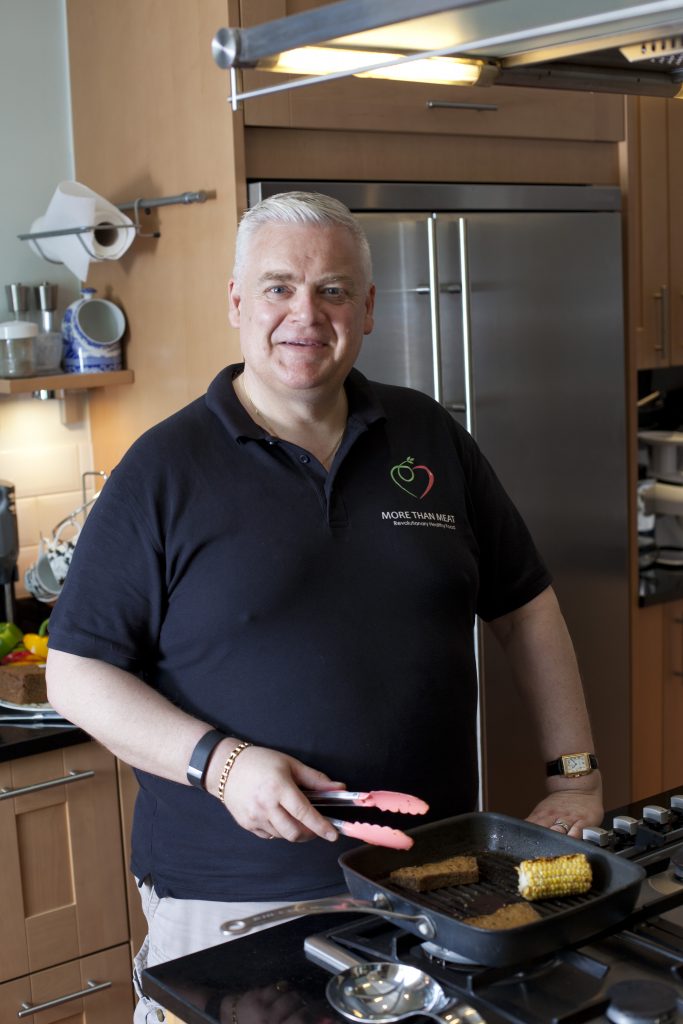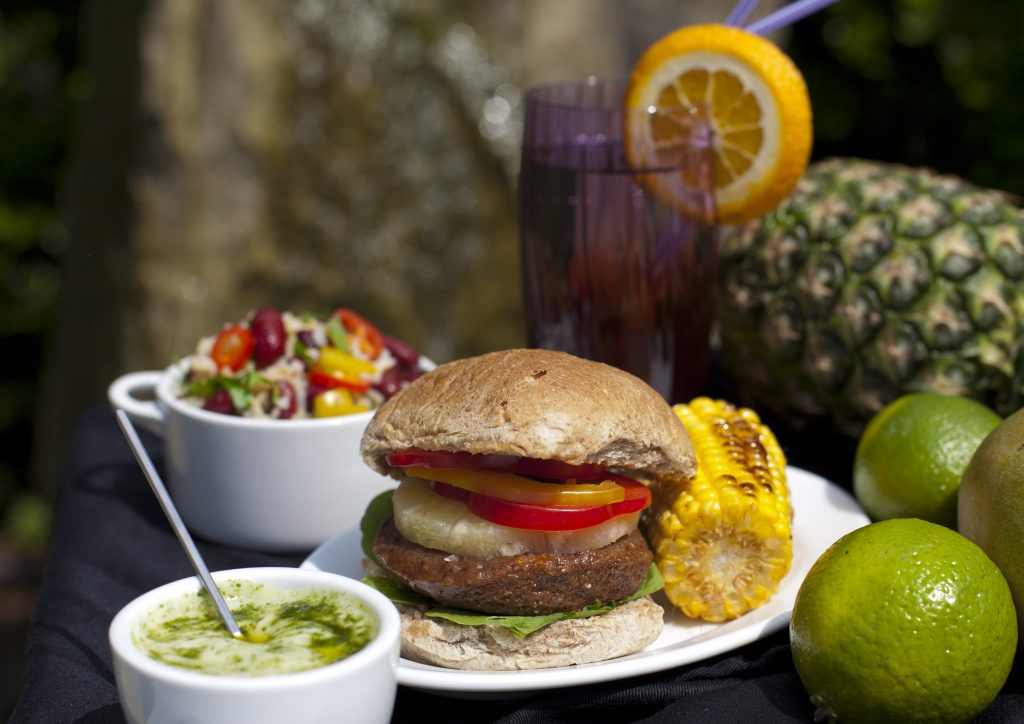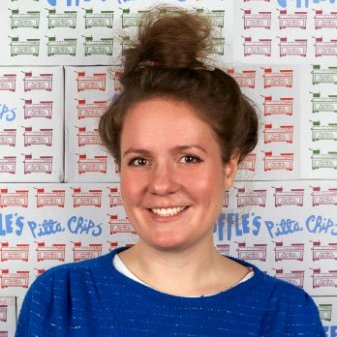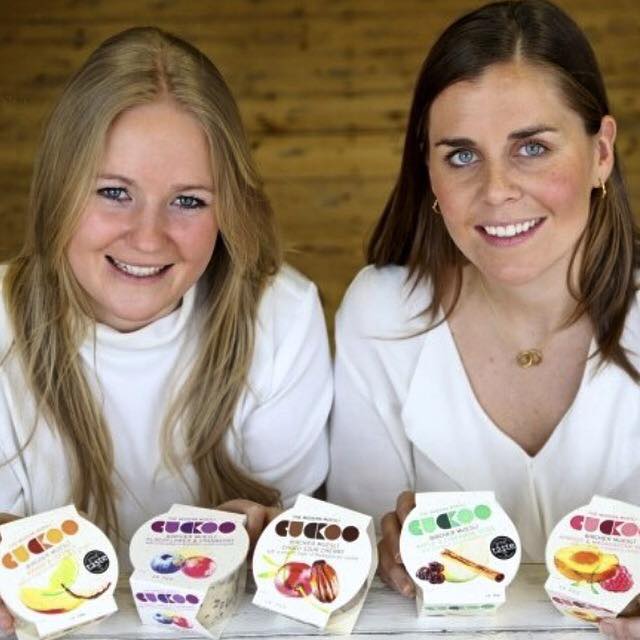Today we feature Barry Honeycombe from More Than Meat. I’ve first encountered his company in London at the Just V Show. Please enjoy the 50th interview!

What kind of business do you run? When did you start it and where is it based?
My business is called Plantalicious Limited and our first range of products is called More Than Meat. More Than Meat is just what it says, a plant protein based meat alternative brand that is more delicious and healthier than animal protein meat. After years of yo-yo dieting, I switched to a whole food, plant-based diet and it revolutionised my health. I founded the company to help others make the same positive change to a meat-reducer lifestyle.
We blend plant-proteins with wholefoods to make our products, which are made in small batches, using real ingredients. More Than Meat burgers and casseroles are protein packed, zero-cholesterol meals, containing no added fats, no eggs, no dairy and, of course, no meat.
Tell us a little bit about yourself and your background.
My background is not in food. Most of my career was spent selling analytics, helping banks and financial institutions make better decisions through data for risk decisions and pricing. After reading The China Study, I studied for a certificate in Plant Based Nutrition through Cornell University’s online programme. I also used to travel to the US a lot for work and happened to be in California so I took a few days to go to a Farms 2 Forks weekend where I ate the most delicious and healthy plant-based foods and met some of my “food heroes”. I came back from the US and immediately starting following a plant-based diet where I eat nothing that has a face or a mother! I now follow a plant-based diet and then founded my company, as I could not find delicious and healthy plant-based alternatives that were not full of salt, fat and sugar. So, I decided to make my own.
What inspired you to start this business?
It was sheer frustration really. The products that were on the market were not what I was looking for. I wanted something that tasted good but that was healthy. I also missed certain textures and flavours that are associated with meat. For me, a burger should have a degree of resistance and chew; it should not fall apart or be dry. I also love all the flavours associated with lamb, such as rosemary, mint, red currants, red wine etc., hence the lamb casserole. My love of food inspired me to start my company. I am passionate about good food and have always loved to entertain and show my love for my friends and family through food. I am not on a crusade to turn the whole world vegan. I simply want to offer some good food where the proteins just happen to come from plants. If my food is tasty enough, I hope that my customers will choose to eat more plant-based foods as part of their diet. My motivation and passion is to provide people with products that are delicious, good for them and good for the planet.

What is your daily routine of running your business?
At the moment it is more of a weekly routine. The earlier part of the week is spent trying to secure new retail and foodservice partners. We have taken a non-traditional approach where we deal direct rather than through wholesalers at the moment. Our online, retail and food service orders are all sent out by courier on Thursdays and my team cook and freeze the products wednesdays to fridays each week. I love those days as the smells drift from the kitchen up to my office!
What are the best and worst parts of running your business?
For me, the thrill of someone saying that they love our products, is still the best feeling in the world. Whilst I know that we cannot “please all the people all the time” it really does hurt when someone does not like one of our products. It’s like being told that you have an ugly baby! What is difficult is to acknowledge that everyone is entitled to his or her own opinions and that our products are not for everyone and then to move on. I am someone who takes criticism to heart and I do not find it easy to let go of criticism and move on. Emotions aside, there are a number of key challenges, for us as a small-scale producer. With our products being handmade means that whilst this ensures a quality product, our costs are high and our capacity does have limits. We also need to drive sales as we are an unknown brand and for us it is key that we secure sufficient regular sales to allow us to expand and grow into the company that we are planning. We want the business to be a force for good, be that through supplying delicious and healthy food that our customers love, by having less of an impact on the planet than animal protein based products, and finally by creating an organisation where our employees and partners thrive and succeed.
Do you use any productivity tools?
We use Paypal for business (for invoicing), Evernote (order processing and bookkeeping), Skype and Mindjet (for planning).
Tell us some fun facts about you or your business!
Our chef is Italian
Whatever the chef says goes!
Our burgers have 23.8g of protein per 100g which is more than animal-based burgers
Plant proteins are more sustainable, it takes 150m2 of land, and 15,000 litres of water to produce 1kg of beef
How was your company funded?
To date all of our funding has come from the founder, although as we grow in size, we will be looking for investors.
What is the best business decision you’ve ever made?
To hire a chef who is as passionate about food as I am.
What are your future plans for the company?
We have a very strong sales pipeline, so we need to look at how we can expand whilst not compromising the quality of our products. By year 5 we will be expanding overseas to markets such as Australia, USA, Canada, Middle East and India. Profit is likely to be in line with the industry average of 5.8% of revenue. Our plans are to clearly call out the delicious nature of our products as well as the positive impact that we will have on our consumers health, the planet and animals.
For more information please visit Morethanmeat.co.uk.






